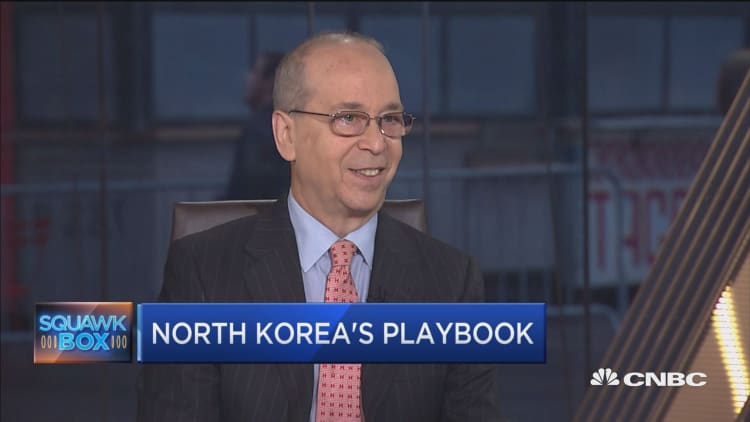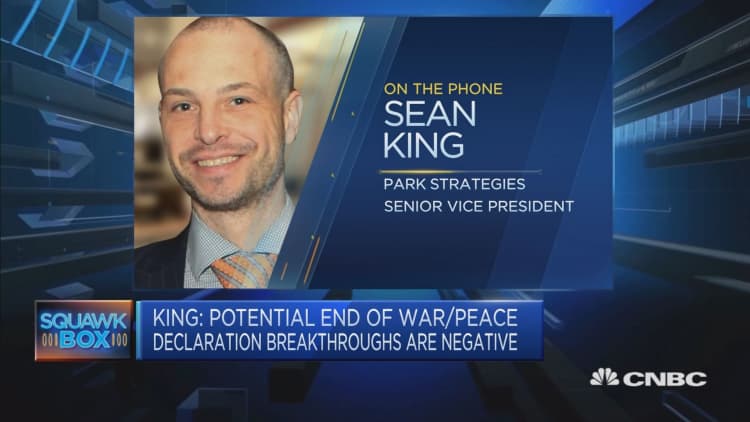South Korean President Moon Jae-in entered office with a pledge to reform the country's family-run conglomerates —known as chaebols — but critics say that initiative has been sidelined as the government focuses its attention on North Korea.
Economic cooperation is a major element of Moon's peace initiative with North Korean leader Kim Jong Un, and chaebols play a defining role in that department. Investment from conglomerates will be crucial to establishing inter-Korea transport links and revitalizing an industrial park in the border region of Kaesong — two projects close to Moon's heart. On a visit to Pyongyang last month, the president was accompanied by the heads of major chaebols who were present to assess potential business opportunities in the reclusive state.
With those corporate behemoths now at the center of Moon's plans for inter-Korea partnerships, strategists say it's unlikely the president will push them on reforms that many consider essential to the economy's competitiveness.
"President Moon is dependent on chaebols for economic cooperation between the two Koreas so given the circumstances, I don't think it's realistic to expect any fundamental reform of chaebols," said Sangin Park, a chaebol expert at Seoul National University.
Even before the first inter-Korea summit in April, the administration did not lay out any concrete measures, added Park. "It is very disappointing."
Chaebols also potentially have a significant role to play in rejuvenating the country's tepid economic growth and lackluster job creation, with the unemployment rate hitting an eight-year high in August.
With North Korea and employment now the two most important policy areas for Seoul, "it is now very likely that President Moon has re-prioritized his policy agendas and sees chaebols, not as a subject of reform, but as an indispensable partner," said Woochan Kim, a finance professor specializing in corproate reform at Korea University Business School.
A spokesperson for South Korea's presidential office acknowledged that corporate participation was important to driving investments in North Korea but warned that "neither the extent of chaebol reform nor the priority placed on it will be diminished."

The fact that Moon recently urged parliament to approve a law that enables chaebols to own internet bank shares up to 34 percent, well above the current ceiling of 4 percent, is also concerning, according to Kim. The law, which got passed last month, could result in more chaebol deregulation, potentially paving the way for conglomerates to own larger banks, Kim warned, adding that it went against Moon's election campaign promise of separating banking and commerce.
In response, the presidential office spokesperson said internet banks would be prohibited from lending to large companies or transacting with their major shareholders.
Taming the chaebols
Chaebols dominate the South Korean economy, with each boasting a range of diverse businesses. Hyundai, for example, is home to one of the world's largest automakers, container shipping firms and steel producers in addition to manufacturing other goods such as solar panels.
But the conglomerates' mode of operation requires a massive overhaul, according to critics. They argue that founding families wield too much power through practices such as cross-shareholding, which comes at the expense of other shareholders. Chaebols are also accused of using their monopolistic clout to squeeze out small and medium-sized enterprises, which create most of the country's jobs. The inheritance of management rights by chaebol family members have also produced multiple fraud cases, analysts point out.
Corruption is also a major issue. From Samsung's Lee Jae-yong to SK Group Chief Chey Tae-won, several chaebol heads have been sentenced to prison for graft-related cases.
Badly needed reforms include stricter antitrust laws, eliminating opaque circular shareholder structures and ensuring the voices of minority shareholders are heard, according to experts. U.S. activist hedge fund Elliott Management, which owns $1.5 billion worth of shares in Hyundai Group companies, recently demanded a restructuring of Hyundai Motor.
On the election trail, Moon promised to act on many of those issues. His commitment was reflected early in his presidency by appointing activist scholar Kim Sang-jo, known as the "chaebol sniper" in local media, to head the Fair Trade Commission, the country's corporate watchdog.

The organization has since taken steps aimed at curbing unfair practices, including an investigation into illegal intra-trading deals. That's helped push some chaebols such as Hyundai and Samsung to announce efforts aimed at streamlining ownership structures.
The government is also pushing for revised laws that would improve governance and implement regulations on chaebol holding companies, according to the presidential office spokesperson. The goal is for those revisions to get passed in parliament this year, the spokesperson added.
But so far, experts say the state's efforts have yet to produce any game-changing results.
"The control imposed by the Korean government on big conglomerates is still rather limited," said Steve Chung, assistant lecturer at the Chinese University of Hong Kong. "One of the major arguments as to why Moon failed to do much on chaebols is because they are important in bringing financial incentives to North Korea," Chung continued, adding that chaebol engagement in North Korea could build confidence for international players to follow suit.
For now, it's still too early for South Korean entities to do business in the North, which is expected to remain under international sanctions until it makes real progress on denuclearization.
The visit of chaebol chiefs to Pyongyang last month was more a show of goodwill than a sign of serious investment consideration, according to Cheon Seong-whun, visiting research fellow at the Asan Institute for Policy Studies, a Seoul-based think tank.
"Kim Jong Un is very interested in developing tourism on the eastern coast and has previously said he wants to establish an industrial compound focusing on labor-intensive industries," said Cheon, who served as South Korea's presidential secretary for security strategy from 2014 to 2017.

